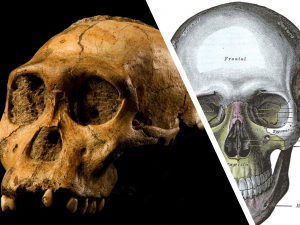Degree Options
We offer a Bachelor of Science (B.S.) degree and a Bachelor of Arts (B.A.) degree, as well as three Concentration areas where students may want to focus their studies. Our students receive hands-on laboratory experiences and will investigate and critically review the techniques used in the study of evolutionary theory, paleontology, functional morphology and behavior. All students will also apply their knowledge in at least one advanced-level capstone courses.
Bachelor of Science (B.S.) degree
This degree is intended to prepare you for careers in the sciences, including advanced degrees in anthropology, medicine, dentistry, physical therapy and veterinary medicine. Students who earn a B.S. are also well placed to work in science-related research and education positions at museums, government offices, NGOs and private industry. Students seeking a B.S. degree will acquire a strong knowledge of the basic sciences (math, chemistry, physics, and biology) in addition to core knowledge in evolutionary anthropology in preparation for a career in the sciences.
Bachelor of Arts (B.A.) degree
This degree is intended as a broader liberal arts exposure to evolutionary anthropology. The requirements are similar in depth to the B.S., but fewer courses in the basic sciences are required. Students seeking a B.A. degree in evolutionary anthropology will gain strong core knowledge in the discipline as a whole in preparation for a variety of possible careers within or outside the sciences.
Formal Concentrations
You may customize your B.S. or B.A. studies further by earning a formal concentration. Concentrations require 3 courses within a given area. These can overlap with other major requirements detailed above. Concentrations are declared with the registrar and will be listed on your transcript. Concentration options are:
Anatomy & |
Behavior, Ecology |
Human |
Or, you may opt not to pursue a concentration and select courses from several informal subdisciplines based on your personal interests. Options include:
- Cognitive Evolution
- Human Evolution and Adaptation
- Human and Comparative Anatomy
- Primate Evolution and Adaptation
- Primate Ecology
- Primate Social Behavior
Course Requirements
| B.S. Degree Requirements | B.A. Degree Requirements |
|---|---|
Core Requirements
Note: No more than two independent studies can be used towards requirements for the major. | Core Requirements
Note: No more than two independent studies can be used towards requirements for the major. |
B.S. Co-Requisites
NOTE: Co-requisite courses can be replaced by equivalent courses/AP credit; contact our Director of Undergraduate Studies (DUS) for details. | B.A. Co-Requisites
|
Tracking Worksheets
Track your progress with your advisor using our evolutionary anthropology worksheet (both B.S. and B.A.):
Approved Electives
There may be other courses, especially “special topics” courses and/or study abroad courses, that would be appropriate as electives. To have a course considered as an elective that is not on this list, you will need to petition the Director of Undergraduate Studies (DUS) in writing. Be sure to include a detailed explanation of how the course relates to Evolutionary Anthropology and your particular line of study in the department. Both your advisor and the DUS must approve the petition.
NOTE: Several courses listed are cross-listed with other departments.
| B.S. Degree | A.B. Degree |
|---|---|
|
|
Cell Biology | |
|
|
Chemistry | |
|
|
Cultural Anthropology | |
|
|
Earth & Climate Science | |
|
|
Economics | |
| Students studying the evolution/ecology of behavior may be interested in some advanced level courses in economics (e.g., game theory, models of cooperation and conflict). See your advisor or the DUS about prereqs and appropriate courses. | |
Environmental Science | |
|
|
Philosophy | |
|
|
Psychology & Neuro Science | |
|
|
Statistics | |
| B.S. students will use statistics as a co-requisite rather than an elective. | Any introductory level stats course (typically 101 or 102) can be used as an elective for the B.A. degree. |



